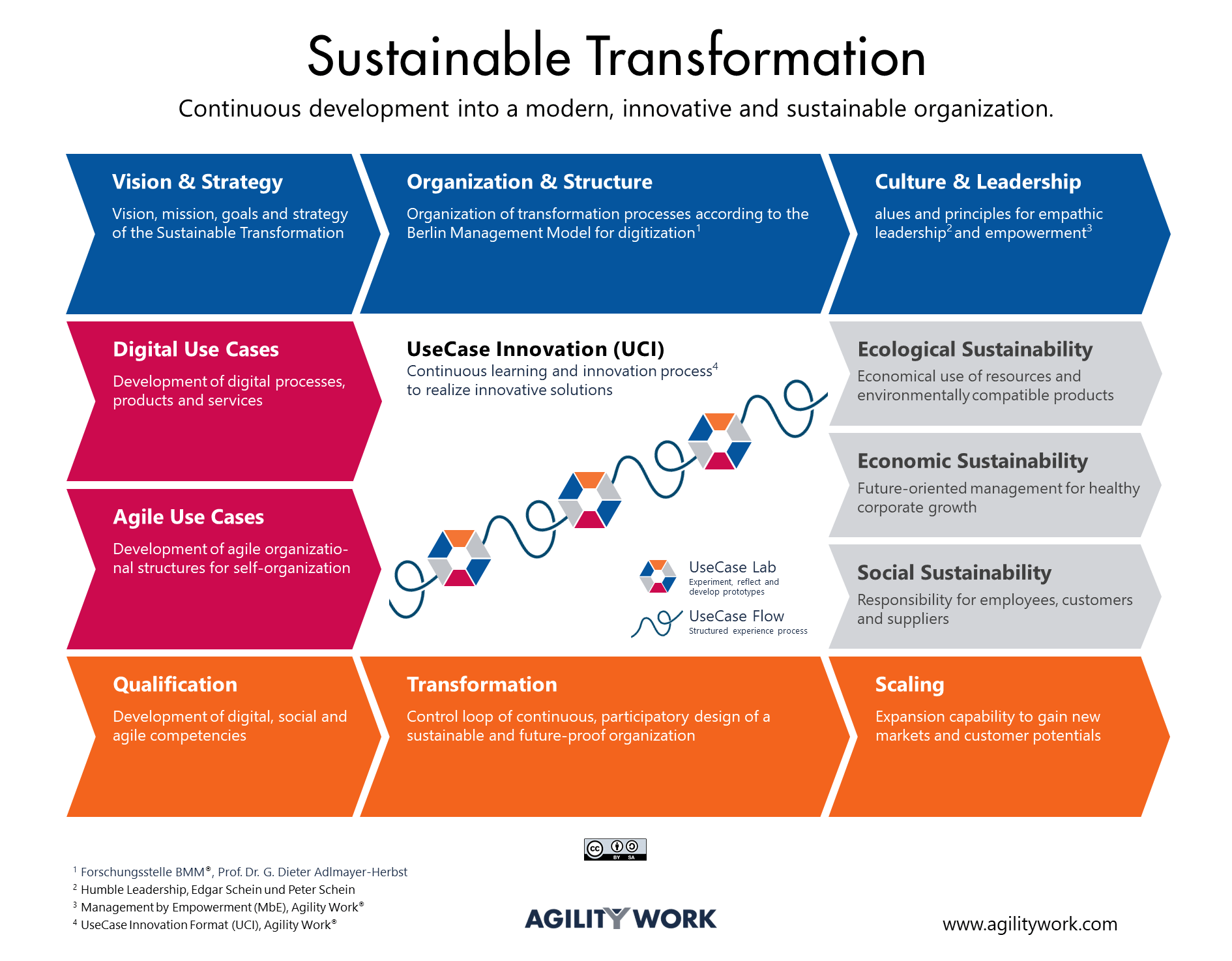Sustainable transformation: DIGITAL + AGILE + SUSTAINABLE
Klaus Schein, CEO Agility Work, 24.06.2021
Sustainable Transformation is designed to seamlessly combine the two initiatives for digitization and cultural change and to leverage them as a high potential for synergy. In our transformation projects to date, we have recognized that decision-making bodies, departments and teams do not always agree on which of the transformation projects is more important – digital or cultural – and thus receive a higher priority in the agenda in terms of resources. The result is that teams split into two camps: 1. the IT/process-oriented „digital“ team and 2. the employee/customer-oriented „cultural“ team. This leads to internal power struggles over sovereignty on the „right“ way to do things: Do we first need digital processes to create a new organizational culture, or do we first need a fault-tolerant learning culture to acquire the knowledge and capability to digitize, with the goal of managing the transformation on our own if possible?
Although discussions – conducted properly – lead to new insights and – ideally – enable a compromise or consensus, one essential aspect often remains unanswered: The question of sustainability and which of the three areas of sustainability we prioritize: 1st focus people, 2nd focus environment or 3rd focus profitability. Or put another way:
So that we achieve benefits for all stakeholders and the environment, by creating attractive jobs, by thinking and acting in an environmentally conscious way, and by being corporate responsible so that strategic and operational goals are achieved?“
Sustainable transformation combines two – previously separate – worlds: Digitization/Digital Transformation and Cultural Change/Agile Transformation. The advantage: a commitment from all stakeholders to an overarching goal, a shared vision and mission: to align the company or organization with the future using new technologies and methods and not just to „take people along“ but to „empower“ them so that they can fully develop their full potential – for more creativity, more performance and more fun at work.
There are many studies that prove that sustainable companies are more successful. In this respect, a transformation aimed at sustainability can be seen as the right path, not least because a common purpose creates a common image. We see a clear strategy and learning culture for more sustainability as the basis for sustainable decisions, so that the aspiration to become a sustainable company does not turn into „greenwashing“, but into a community that internalizes and lives sustainable corporate management in its culture and DNA.
Basically, models fulfill several functions at once: Gaining new insights, communication tools to illustrate facts, and to review or benchmark strategies and transformations.
The following model of the Sustainable Transformation shows what we consider to be the essential dimensions:

Image: Sustainable transformation, developed by Klaus Schein, Agility Work GmbH, 02.07.2021
CC BY-SA
The Sustainable Transformation Model is available under Creative Commons License CC BY-SA (Attribution-ShareAlike). This license allows others to distribute, remix, improve, and build upon the work, even commercially, as long as the creator of the original is credited and new works based on the new work are published under the same terms.
The model integrates several models, including:
The Berlin Management Model for Digitization (BMM®) from the Berlin Management Model for Digitization research center (www.bmm-online.de) shows the dependence of successful digitization on the need for internal renewal, in which the focus is not on technology but on people. In his book Change Management – so klappt’s!, Prof. Dr. D. Georg Adlmayer-Herbst describes the special feature of change management: the implementation of the strategy can only take place when the readiness and skills of the employees have been built up (cf. Process Model of the Change Process, p,17). This leads to the question: „How can we get people to accept and go along with the change?“ (cf. p.23).
The Berlin Management Model for digitization is a solid basis for the questions of participation, organization and implementation and shows how a two-handed transformation can succeed, 1. digitization through the development of innovative business models (e.g., platforms), digital processes, products and services for new customer experiences and 2. internal renewal in small steps (agile transformation), through readiness for change, development of agile methods and empowerment for self-organization.
A culture for more sustainability (people, environment, profitability) needs a new leadership approach that is increasingly based on personal relationships instead of transactional role relationships (cf. Humble Leadership – Erfolgreich führen mit Beziehung, Offenheit und Vertrauen; Edgar H. Schein and Peter A. Schein, 2019, p. 17). Any cultural change that does not sufficiently take these three aspects into account or crosses them will prove to be a boomerang in the long run, meaning: the supposedly quick success of digitization will sooner or later be followed by a costly pivoting in the right direction, because we have indeed accelerated and digitized/automated and networked many things, but this at the expense of many people with whom we have not managed to build a trust-based relationship and enable them to learn, participate and share in the success. What we need is more openness, trust and empowerment. Humble Leadership describes why this is so important. The Agility Work team walks the walk with you.
We offer Sustainable Transformation in the following formats:
Our keynote speakers, presenters and coaches:
Request